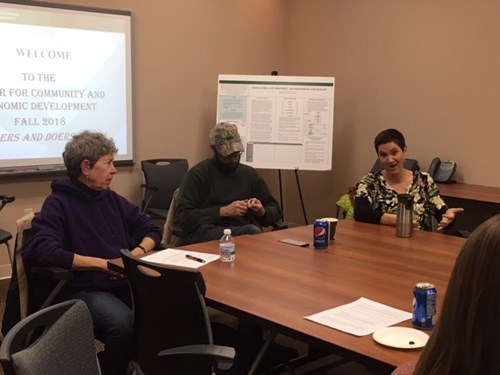Thinkers and Doers, Fall 2018 Forum on Urban Agriculture

By Heather Mahoney
On November 15, 2018, CCED hosted a Thinkers and Doers forum entitled “Urban Agriculture: Cultivating Community Connections.” Through Thinkers and Doers forums, the CCED aims to bring together innovative minds in the community to discuss a topic of concern or interest in the area. This year’s panel and attendees consisted of community members interested in urban agriculture, how it creates social connections among community members, and the potential it has in providing a fresh food source for the area. Our panel members included local experts on Lansing’s urban agriculture system such as John Krohn, Ingham County Land Bank’s Garden Program manager; Laura DeLind, Urbandale Farm board member and former MSU professor whose research focused on the US food system; and Lacey Ingrao, manager at Bee Wise farms, one of Lansing’s many urban farms.
To begin the forum, the panel members shared their thoughts on how they have seen urban agriculture create community connections in Lansing. John Krohn pointed out that he knows several families, including his own, that moved to Lansing specifically because of the number of gardens and gardening opportunities. Lacey agreed that was the reason she moved to Lansing as well. They also noted that the reason both of them know most of their neighbors for several blocks is because they all farm together. Laura DeLind reminded everyone that food and agriculture is central to any culture or community: “Without it, a community is truly missing something,” she said.
Following these brief presentations, we turned to the audience—many of whom were experts on the topic themselves—for questions. We discussed how people obtain land for urban gardening; accessibility to water and personal investments in the land; diversity of people working with urban gardens and diversity of food grown; possible opportunities for co-ops in the area; and profitability of urban farming. Like traditional agriculturalists, urban farmers often struggle to obtain a solid profit margin, especially if farmers want to pay themselves. It was noted that a key trait of the urban farmer, and traditional farmers as well, is that they will always be upfront and honest about their farm’s finances. Even more importantly, farmers from all backgrounds are always willing to help a fellow farmer. Part of what makes the Eastside of Lansing such a great urban farming community is how easy it is to access other farmers and their tools, tips, and tractors. This urban farming community is able to share one another’s resources to help their neighbors grow their gardens and practices.
The Eastside of Lansing has a large and ever-growing urban agriculture community. This community supports each other wholly and welcomes newcomers with open arms. There are currently initiatives to bring more unity to their marketing, such as the “Lansing Grown” label, which would allow Lansing city and township farmers to be recognized as local producers at farmers’ markets and local restaurants. With continued growth and opportunities for marketing their products, urban agriculture can become even more of a community connector and provider of a common culture of fresh healthy food among Lansing residents.
If you would like to suggest future topics or would like to learn more about the Thinkers and Doers forums, contact Heather Mahoney at mahone86@msu.edu.

